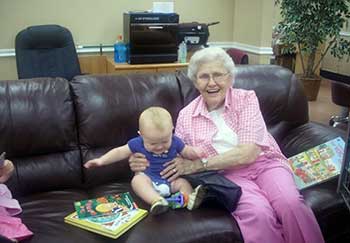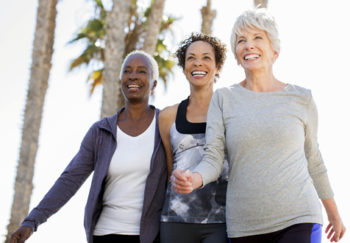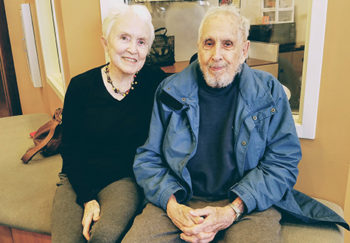
“All my friends are dead.” I’ll never forget hearing my grandmother say this. Her voice trembled with a raw despair I’d never heard before. It struck me that, even if her situation wasn’t surprising – anyone in their late 80s would expect some loss — she was still devastated. Her world had fallen apart, and yet our family went on, as if nothing had changed. Certainly, we worried about her heart failure diagnosis, but no one talked about Grandma’s broken heart. We never discussed her risk for elderly depression.
We didn’t, but we should have. As my grandmother’s social circles dwindled, she grew isolated. And according to one report, the health risks of prolonged social isolation are the same as smoking 15 cigarettes a day.
Which made me start to think about my own future. I exercise and eat well to avoid stepping on the landmines of old age: heart attacks, stroke, Alzheimer’s, etc. But what am I doing to prevent loneliness? What can I do?
For guidance, I spoke with Meredith Lee, DO, a geriatric psychiatrist at UVA. Our conversation made it clear: If we care about the health of aging loved ones, we need to pay attention to their mental and emotional states, too.
The Aging Population is Growing – Lonely
Lee cites a recent report by the AARP Foundation to explain why elderly depression is on the rise. According to the study, more than 35% of adults over 45 feel lonely. As the large baby boomer generation ages, the numbers of people feeling lonely will likely swell.
Loneliness, social isolation and clinical depression, Lee explains, can cause and exacerbate each other. That is, social isolation can lead to loneliness; loneliness can cause depression. But the relationships can flow in the other direction, too. This can prove challenging for caregivers trying to understand how an older loved one is doing.
“Depression is not a normal sign of aging,” says Lee. There’s nothing inherent to the aging process itself that causes clinical depression.
However, “we’re social creatures,” Lee says. A number of cultural factors contribute to elder isolation, like shifting family norms and increased relocations or geo-mobility. It makes sense that a loss of social and familial networks has negative consequences like “feeling a of lack of connection or support,” or, in a word, loneliness.
“No Pill for Loneliness”
Loneliness is, of course, a subjective experience that’s hard to quantify, diagnose or even treat. “There’s no pill for loneliness,” Lee says.
But the effects of loneliness over time can lead to very tangible and dangerous illness, including “high blood pressure, heart disease, obesity, a weakened immune system, anxiety, depression, cognitive decline, Alzheimer’s disease, and even death,” Lee says. Feeling lonely ups your risk of early death by 26%.
In fact, research on loneliness and the cardiovascular system indicates that “loneliness can be more dangerous to your health than obesity.”
The Causes of Elderly Isolation You Didn’t Know About
Lee cites a number of factors that commonly isolate older people:
- No transportation
- Loss of physical ability and function
- Lack of children/living family members
A key factor to note: You can’t tell loneliness by looking. As a National Institute of Health report suggests, “Some people feel lonely despite being surrounded by family and friends.” You’ll have to ask.
But Lee does describe a number of less well-known causes of isolation for which you can look.
Vision Problems
I ask Lee why I don’t see a lot of people reading in their old age — something I was looking forward to doing nonstop after retirement. She notes that losing eyesight from macular degeneration or glaucoma often keeps people from hobbies they love, like reading or doing puzzles.
Eyesight also damages relationships: “They can’t see facial expressions, which harms their ability to relate to people.”
Another effect of vision loss or blindness in old age has to do with the fact that “vision is a huge portion of what the brain does,” Lee says. “A lack of vision affects mental health, and can contribute to depression, anxiety and cognitive problems.”
Ageism
“When people assume an older person is too old to participate in an activity, they don’t even ask,” Lee says.
Low Income
A limited income can limit access to socialization opportunities, and many seniors struggle with poverty. Half of older adults making less than $25,000 a year, per the AARP report, are lonely.
Sexual Orientation/Gender Identity
“Older LGBTQ individuals are 14% more lonely than others,” Lee says. Many seniors lack the family support their heterosexual counterparts enjoy. And fear of discrimination due to sexual orientation can cause seniors to return to a closet they’d left years ago.
Embarrassment & Shame
A stigma around depression still exists, too. People don’t want to admit to or talk about their difficult feelings. So, even though Lee says many seniors experience symptoms of depression, she doesn’t use that term. “I often ask my patients about ‘dampened spirits,’” Lee says.
Social Media
“Communicating via social media versus in-person contact is actually a risk factor,” Lee says. “Technology can be a tool for social connectedness, but it can’t replace human contact.”
When it’s Not Depression
Lee spends much of her time educating caregivers and family members about aging and mental health. Some behaviors may look like depression but really point to something else, either psychological or medical. Recognizing depression means allowing for and taking seriously other possibilities.
Wanting to Die
Lee has patients who say things like, “’I don’t understand why I’m still here.’ They’re ready to die. It’s not a death wish, but they feel like a burden and lack a sense of purpose. They’ll say, ‘the money to support me could go to a college fund.’”
Does this mean they’re depressed? “Not necessarily,” Lee says. An older adult may play bingo, enjoy activities and friends, and still express a sense that “people weren’t made to live this long.”
Elderly Depression Resources
- Connect2Affect – tools for self-analysis and guides for helping others to end senior isolation
- Friendship Line – crisis support for isolated seniors: 800.971.0016
- Suicide prevention hotline – 800.273.8255
- The Center – local senior community – 434.974.7756
The Other Two D’s: Dementia and Delirium
“They call them the 3 D’s of geriatric psychiatry,” Lee explains. “Depression, dementia, delirium; they’re all interrelated, symptoms overlap.” Due to their similarity, people often use the terms interchangeably or mistake one for another.
Dementia, of which there are various kinds, refers to cognitive impairment, mild or major. Psychiatrists measure mental impairment through deficits in memory, language, and executive function. When impaired, an older adult has difficulty with activities of daily living, like managing finances and taking medication.
Delirium, on the other hand, refers to a state of agitation, disorientation, confusion and paranoia.
Elderly depression can also cause problems in memory and decision-making. A parent refusing to take her medicine could have dementia or be severely depressed. Agitation could mark the presence of delirium or be a frustrated reaction to a senior unable to do something he used to do.
Urinary Tract Infections
To make all this even more complex, an older person with a urinary tract infection can hallucinate and become violent and confused. Lee says, “The underlying infection causes global cognitive dysfunction, and families don’t understand. How can the bladder impact the brain?”
Five Ways to Combat Elderly Depression & Isolation
When it comes down to it, caregivers, family members and seniors themselves can do a lot to prevent loneliness and depression.
1. Create Community
Older people who volunteer, engage in religious or social communities, or visit with neighbors have less loneliness and better overall health outcomes.
Planning for aging? Get involved now. Set up social networks with longevity, ones that include people of all ages and have regular, consistent gatherings you can trust will continue.
Caring for an older adult? Reach out. Make a point to visit with your elderly neighbors on a regular basis. Schedule phone calls with distant relatives. Provide regular touch points they can count on. And, if you can, try to help your aging loved one build relationships and find support through local resources.
2. Sleep it Off
Good sleep hygiene decreases loneliness, Lee says. “REM sleep filters out toxins, including beta amyloid, which contributes to Alzheimer’s. And insomnia is linked to depression.”
Planning for aging? Set up good sleep habits now.
Caring for an older adult? Ask about sleep habits. Reach out to a healthcare provider if needed.
3. Exercise & Diet
At any age, an active lifestyle and healthy eating habits contribute to a person’s overall well-being and decrease feelings of loneliness.
Planning for aging? You know the drill. Take special precautions by adopting low-impact exercise you can do throughout your lifetime, like tai chi or swimming.
Caring for an older adult? Sharing healthy meals and setting up times to take walks or go swimming together promote health and create enjoyable social interactions.
4. Avoid Your Own Ageism
Remember, older adults don’t lose their feelings as they age. If they’ve lost a spouse or friends, they deserve the space to experience grief. If they’re frustrated from vision loss, ashamed of dementia, or feeling like a burden, validate those feelings with your care and attention. They’re real.
Need Help With Elderly Depression?
Call for an appointment with geriatric specialists at the UVA Outpatient Psychiatry Clinic.
Planning for aging? Keep challenging yourself, trying new things, meeting new people. Being set in your ways or only interacting with people you know can contribute to isolation later in life.
Caring for an older adult? Make an effort to ask about people who have died or the constraints of illness. Look through old photos and listen to stories. You’ll be surprised at how much you learn about the other person – and yourself.
5. Watch for Signs of Depression
Whether caring for yourself or another person, check in. List the symptoms you’re seeing and visit a geriatrician who can help you determine what kind of help you need.


I would add that developing lasting relationships with family members is an important part of “aging gracefully” Our children and grandchildren can be a key element in aging without depression and loss of involvement in life. Can we stay involved in the next generation of life? Are we aware and involved in the world and community around us enough to be involved?
The Green House Model is a wonderful alternative to many nursing homes, but only a small percentage of us can afford to live in one. What will we do with the rest of us?
What might be some alternatives?
I think the pandemic has further compounded the prevalence of depression in seniors. This article shares some additional warning signs to watch for and tips to help if you suspect depression in someone you love: https://stayhomecare.com/warning-signs-of-senior-depression-and-how-to-help/